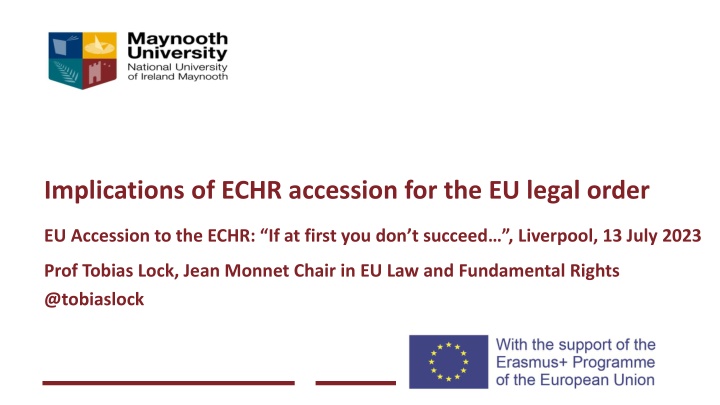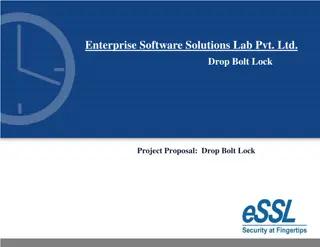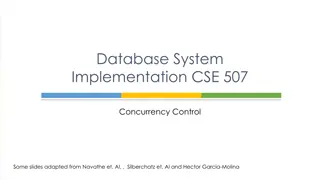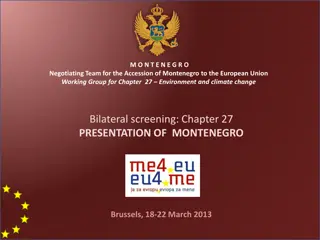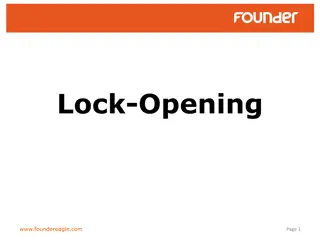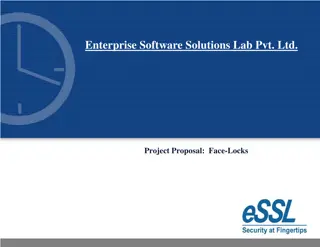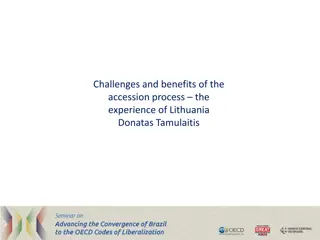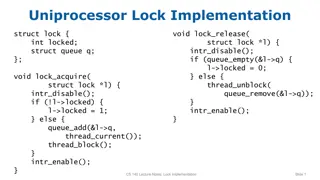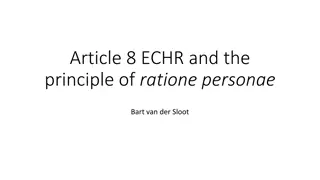Implications of ECHR Accession for EU Legal Order: Prof. Tobias Lock's Insights
Explore the implications of EU accession to the ECHR in Prof. Tobias Lock's presentation. Delve into the new role of the EU as a gatekeeper, inter-institutional dynamics, the Court of Justice's role, and the potential impact on fundamental rights protection within the EU legal framework. Discover the EU's involvement as a co-respondent and the mechanisms associated with potential violations.
Download Presentation

Please find below an Image/Link to download the presentation.
The content on the website is provided AS IS for your information and personal use only. It may not be sold, licensed, or shared on other websites without obtaining consent from the author.If you encounter any issues during the download, it is possible that the publisher has removed the file from their server.
You are allowed to download the files provided on this website for personal or commercial use, subject to the condition that they are used lawfully. All files are the property of their respective owners.
The content on the website is provided AS IS for your information and personal use only. It may not be sold, licensed, or shared on other websites without obtaining consent from the author.
E N D
Presentation Transcript
Implications of ECHR accession for the EU legal order EU Accession to the ECHR: If at first you don t succeed , Liverpool, 13 July 2023 Prof Tobias Lock, Jean Monnet Chair in EU Law and Fundamental Rights @tobiaslock
Overview 1. Introduction 2. Accession rationales 3. The EU s new role as a gatekeeper 4. What new relationship between the two courts? 5. Accession rationales achieved? maynoothuniversity.ie
Introduction Primary question: what are the implications for the EU s own legal order, in particular: inter-institutional dynamics the role of the Court of Justice? Secondary question: will EU accession lead to a better protection of fundamental rights in the EU? maynoothuniversity.ie
New: The EU as a gatekeeper Co-respondent, Article 3 DAA 2023 2. Where an application is directed against one or more member States of the European Union, the European Union may become a co-respondent to the proceedings in respect of an alleged violation notified by the Court if it appears that such allegation calls into question the compatibility with the rights at issue defined in the Convention [ ] of a provision of European Union law, [ ]. The Court shall make available to the European Union information concerning all such applications that are communicated to its member States. [ ] 3. Where an application is directed against the European Union, the European Union member States may become co- respondents to the proceedings in respect of an alleged violation notified by the Court if it appears that such allegation calls into question the compatibility with the rights at issue defined in the Convention or in the Protocols to which the European Union has acceded of a provision of the Treaty on European Union, the Treaty on the Functioning of the European Union or any other provision having the same legal value [ ]. 5. The European Union or its member States may become a co-respondent, either by accepting an invitation from the Court or upon their initiative. The Court shall admit a co-respondent by decision if a reasoned assessment by the European Union sets out that the conditions in paragraph 2 or 3 of this article are met. The Court shall communicate its decision to the parties. Before a High Contracting Party becomes co-respondent, the Court shall grant the applicant an opportunity to state its views on the matter. The admission of the co-respondent does not prejudge the Court s decision on the case. 6. The Court shall terminate the co-respondent mechanism by decision at any stage of the proceedings only if a reasoned assessment by the European Union sets out that the conditions in paragraph 2 or 3 of this article are no longer met. The Court shall communicate its decision to the parties. Before the co-respondent mechanism is terminated, the Court shall grant the applicant an opportunity to state its views on the matter. Explanatory report, para 62: The conclusion of this assessment by the EU will be considered as determinative and authoritative. EU unilateral declaration (draft): Upon its accession to the Convention, the European Union will ensure that: a. it will request to become a co-respondent to the proceedings before the European Court of Human Rights or accept an invitation by the Court to that effect, where the conditions set out in Article 3, paragraph 2, of the Accession Agreement are met; [ ] maynoothuniversity.ie
EU as gatekeeper: co-respondent Which institution will make the decision? Presumably EU Commission (Legal Service) Will this decision be reviewable Article 263 TFEU Examples: Refusal to allow the MS to join as co-respondents Refusal on behalf of EU to join (or to terminate co-respondent status) Termination of co-respondent status (for MS or EU) Challengeable act (presumably yes because neither recommendation nor opinion) Challenge by privileged applicant (MS/other EU institution) Challenge by applicant before the ECtHR (individual)? Direct and individual concern, Article 263 (4)? applicant belongs to a closed group of persons Inter-institutional dynamics could become interesting here maynoothuniversity.ie
EU as a gatekeeper: prior involvement Co-respondent (prior involvement), Article 3 DAA 2023 7. In proceedings to which the European Union is a co-respondent, if the Court of Justice of the European Union has not yet assessed the compatibility with the rights at issue defined in the Convention or in the protocols to which the European Union has acceded of the provision of European Union law as under paragraph 2 of this article, sufficient time shall be afforded by the Court for the Court of Justice of the European Union to make such an assessment, and thereafter for all parties to make observations to the Court. The European Union shall ensure that such assessment is made quickly so that the proceedings before the Court are not unduly delayed. The provisions of this paragraph shall not affect the powers of the Court, including to make a final determination of whether there has been a violation of the Convention. Explanatory report, para 76: Determining whether it is necessary to initiate the prior involvement of the CJEU under Article 3, paragraph 7 presupposes depends upon a finding by the EU of whether the CJEU has already undertaken the assessment [ ]. This finding will be considered as determinative and authoritative maynoothuniversity.ie
EU as a gatekeeper: prior involvement Who will decide on part of the EU? Commission (Legal Service)? On what substantive basis? CJEU has not yet assessed the compatibility with the rights at issue defined in the Convention CJEU now rarely mentions ECHR rights, so probably a substantive test: has CJEU considered fundamental rights compliance How strictly will this be applied? Example 1: no reference made to the CJEU in the concrete case. Example 2: no reference in the concrete case, but in other (prior) cases the CJEU considered the issue Example 3: reference was made, CJEU did not address fundamental rights/was not asked to do so Example 4: reference was made, CJEU addressed fundamental rights issues, but not all of the ones raised before ECtHR Example 5: reference was made, CJEU addressed the issues, but very superficially maynoothuniversity.ie
EU as a gatekeeper: prior involvement New procedure for prior involvement needed at EU level Amendment to the ECJ statute, Article 281 TFEU? Modelled on Art 267 (presumably) Expl report: shall mean to rule on the validity or the interpretation of a legal provision Which questions will be referred? Will the questions be formulated by the Commission in the way a national court does this under Art 267; is the Court restricted to answering those questions? Substance: compatibility with the ECHR (as DAA suggests) or more broadly with EU Charter (or EU law as a whole)? Consequences of CJEU s findings internally Findings of invalidity of EU secondary law are possible. Res judicata as far as the concrete case is concerned? maynoothuniversity.ie
EU as a gatekeeper: prior involvement Prior involvement and the TWD case law Case C-188/92 Textilwerke Deggendorf: if applicant could have challenged an EU measure directly (Article 263 TFEU), then an indirect challenge under Article 267 TFEU is not possible Applied to sanctions cases (HR-dimension!), see e.g. Case C-158/14, E and F, paras 66: to accept that a person who would unquestionably have had standing to bring proceedings under the fourth paragraph of Article 263 TFEU for the annulment of an act of the European Union could, after the expiry of the time limit for bringing proceedings laid down in the sixth paragraph of Article 263 TFEU, contest the validity of that act before the national courts, would amount to enabling the person concerned to circumvent the fact that that act is final as against him once the time limit for his bringing an action has expired Should this apply to prior involvement situations also? Tension between: subsidiarity (prior involvement) and legal certainty (TWD) Compromise perhaps: prior involvement, but no finding of invalidity by the CJEU? maynoothuniversity.ie
The EU as a gatekeeper: inter-party cases Inter-party cases, Article 4 DAA 2023 3. The European Union and its member States in their relations with each other shall not avail themselves of Article 33 of the Convention. Nor shall the member States of the European Union avail themselves of Article 33 of the Convention insofar as a dispute between them concerns the interpretation or application of European Union law. 4. The Court shall provide the European Union upon request with sufficient time to assess, as a matter of priority, whether and to what extent an inter- party dispute under Article 33 of the Convention between member States of the European Union concerns the interpretation or application of European Union law. maynoothuniversity.ie
The EU as a gatekeeper: inter-party cases Inter-state applications between EU-MS extremely rare Protection of CJEU exclusive jurisdiction, Article 344 TFEU (see Prot 8 Lisbon Treaty) E.g. Commission v Ireland (Mox Plant) re mixed agreements EU internal decision Similar to co-respondent/prior involvement decisions Institutionally: European Commission? (Some sort of) precedent here: Iron Rhine Arbitration (Belgium v NL) Same questions as to reviewability arise maynoothuniversity.ie
How to deal with the CFSP? Remember: this was a big deal in Opinion 2/13 Because CJEU does not have full jurisdiction over the CFSP Article 275 TFEU: The Court of Justice of the European Union shall not have jurisdiction with respect to the provisions relating to the common foreign and security policy nor with respect to acts adopted on the basis of those provisions. However, the Court shall have jurisdiction to monitor compliance with Article 40 of the Treaty on European Union and to rule on proceedings, measures against natural or legal persons adopted by the Council on the basis of Chapter 2 of Title V of the Treaty on European Union. maynoothuniversity.ie
How to deal with the CFSP? What does the 2023 revamped DAA tell us? Nothing i.e. internal rules will need to fix the problem Intergovernmental interpretative declaration giving the CJEU jurisdiction in cases where a case has been brought before the ECtHR (which touches on the CFSP) Option under discussion: Une d claration intergouvernementale interpr tative visant, au nom de l effet utile de l ensemble des stipulations des trait s et afin de r concilier des stipulations contradictoires, conf rer une comp tence juridictionnelle la Cour de justice de l Union europ enne en mati re de politique trang re et de s curit commune dans les cas d actions introduites, par des requ rants ayant qualit agir devant la Cour europ enne des droits de l homme, pour des violations de droits fondamentaux par l Union europ enne ; (French Senate, March 2023) maynoothuniversity.ie
How to deal with the CFSP? How would that solution work? Probably would allow for the co-respondent mechanism to be used And for the prior involvement of the CJEU Would this be compatible with the EU Treaties? International agreements can confer jurisdiction on the CJEU, provided this does not change the nature of the function of the CJEU (Opinion 1/91, para 61 Here: purely internal act (not in the DAA!) Would nature and function of CJEU change? Maybe not if modelled on Article 267 BUT: hard to square with Article 275 TFEU maynoothuniversity.ie
Conclusions EU Commission in the driving seat Unresolved questions as to Reviewability of Commission decisions to join (or not to join) etc Potentially time-consuming internal litigation to follow Relationship between prior involvement and established doctrines Res judicata Validity review in general and TWD in particular CFSP quandary has not yet been solved Will all of this improve the protection of human rights in the EU? maynoothuniversity.ie
Thank you very much for listening maynoothuniversity.ie
